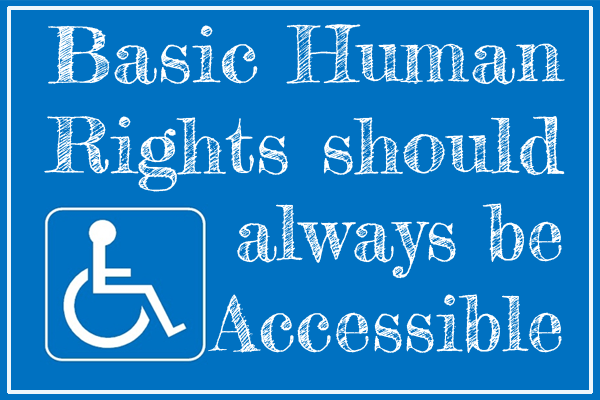Article-Detail

The Americans With Disabilities Act Works for Everyone
In 2008, Josefina Hernandez, an 18 year Walgreens employee in San Francisco had a hypoglycemic attack due to her diabetes and needed to stabilize her sugar. She usually carries candy in her pocket for instances such as this, but on this day her pockets were empty. Looking for relief, Josefina went to the snack aisle and grabbed a bag of chips and began eating them. She was observed and approached by a security guard who didn’t understand her situation. When he asked her why she took the chips without paying she replied, “my sugar low, not have time” and continued eating the chips. The security guard then reported what he saw to management, whom Josefina made aware of her diabetes prior to this day. After eating the chips, Josefina returned to her register, paid the $1.39 for the chips and continued working. Later, she was called into her manager’s office and terminated for stealing chips. Walgreens and the Equal Employment Opportunity Commission (EEOC) on Josefina’s behalf, fought over this for six years before they reached a settlement. In the end, the courts saw Josefina as an 18 year employee with no disciplinary record and a disability (diabetes) and an employer who failed to provide accommodations for this disability they were aware of. A clear Americans with Disabilities Act (ADA) violation.
The Department of Labor (DOL) describes The Americans with Disabilities Act this way “prohibits discrimination against people with disabilities in several areas including employment, transportation, public accomodations, communications, and asscess to state and local government programs and services. Title 1 of the ADA protects the rights of both employees and job seekers.” Essentially, if the accommodation does not cause undue harm to the employer, the employer needs to provide access for employees and job seekers. The broad application of ADA includes public busses, closed captioning, and access to financial assistance. The law does not consider an employer's knowledge or ignorance of the ADA, only that protections are provided to each employee fairly. To put it simply, not knowing is not a defense. Some common disabilities brough to EEOC include cancer, dwarfism, epilepsy, deafness, blindness, traumatic brain injury, HIV, back injuries, diabetes, PTSD, and depression. ADA does not stop there, it also protects employees (and job seekers) from “myths, fears or stereotypes concerning certain impairments, and discharging qualified workers on the basis of disability.”
A few facts to consider:
1. There are approximately 40.7 million (12%) Americans living with disabilities, West Virginia has the highest percentage (20.2) and Utah has the lowest (9.6).
2. 7.6 million are aged 18-64 and hold jobs.
3. On average, each of those americans earn $23,006.
4. Since 2011, the EEOC has filed more than 200 discrimination claims under ADA.
5. Since 2011, the EEOC has recovered approximately $52,000,000 in damages related to their claims.
Kevin McDowell lost vision in his left eye in a childhood accident. He enjoyed a normal childhod and grew to become a professional oil driller. Over 37 years he worked in a number of oil rig jobs for various companies around the state of Alaska in spite of his disability. In 2013 the Parker Drilling Company offered a job to McDowell. During his medical exam it was revealed that he was blind in his left eye. Parker Drilling said that McDowell’s blindness in one eye “posed a direct threat to Mr. McDowell and other employees working on the rig floor” and rescinded its employment offer. The case was argued in the US District Court in Alaska where the judge found that 1. McDowell’s injury qualified him for coverage under ADA, 2. He had an otherwise successful 37 year career despite his monocular vision, and 3. He was denied employment because of the employers (invalid) beliefs about his disability. McDowell was awarded $245,000 in compensatory damages, emotional pain and distress, and back pay because there was no reason to rescind the offer outside of the disability, in fact, Parker management said his disability was the reason.
In 2014, Walgreens agreed to pay Josefina Hernandez $180,000, offer her an apology, post its revised policy regarding accommodation of disabled employees, provide anti-discrimination training, make periodic reports to the EEOC, and post a notice regarding the decree for three years all because they did not act on information they knew well. 1. She had diabetes (a legal disability she previously informed her employer of) 2. Allowing her to eat a bag of chips to balance her blood sugar did not create undue harm 3. Josefina paid for the bag of chips 4. She had no prior disciplinary record over 18 years. Any reasonable person could see that termination was an overreaction. Taking this any further than a discussion with her direct supervisor is going too far. Going to court over a $1.39 bag of chips makes management look petty, losing $180,000 over that bag of chips makes management look less than competent.
Matthew 25:40 says, “Truly I tell you, whatever you did for one of the least of these brothers and sisters of mine, you did for me.” This passage does not imply that there are people who are less than others, the passage actually refers to the vulnerable meaning the sick, elderly, poor, debtors, and the disabled. In most of the cases brought by EEOC, an objective view of the facts and a compassionate conversation would have avoided an expensive, messy, and avoidable court confrontation. Take some time and get familiar with the ADA, carefully consider how you treat everyone at work, and you will SOAR!
William A. Brown
February 2, 2020
https://www.eeoc.gov/eeoc/litigation/selected/ada_litigation_facts.cfm
https://www.dol.gov/general/topic/disability/ada
https://www.census.gov/newsroom/facts-for-features/2019/disabilities-act.html




